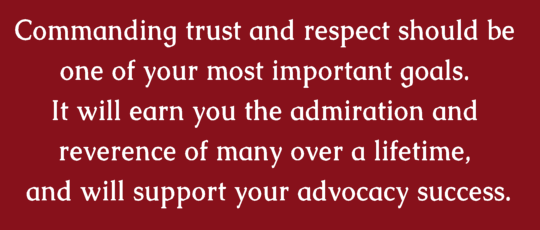Last week I shared with you two stories of my physician heroes, why they are my heroes, their relationship to my work in patient empowerment and patient advocacy, and why you, too, should emulate their actions; their professionalism, their behavior, and the actions they each took to buck a dysfunctional system.
It’s all good, and true to karma, what went around came around – today good comes back to them. They both have stellar reputations within the community and among other physicians worldwide. Well-respected. Well-deserved reputations.
Which takes us to today, and the karma that has come around to one of the doctors who did not behave well.
I mentioned last week the very arrogant oncologist who led my misdiagnosis odyssey. His arrogance was apparent in so many ways. When one of the lab reports referenced an additional missing lab report, not only had he not realized it wasn’t present, but then (after I figured out, and alerted him that it was missing), he told me he was sure it would make no difference anyway. (It did.) When I insisted on a second opinion before starting chemo, he yelled at me – I had no time to waste! I needed to start chemo immediately! (I didn’t.) When I asked if there wasn’t some other form of treatment that might be effective, he admonished me for second-guessing him – how dare I! That I needed to stop looking on the internet for cures! (OK – he might have been right about that one, but I sure as heck didn’t believe that at the time, and it’s a d*mn good thing I kept looking!)
Once it was proven that he was wrong (as in – I didn’t die !), rather than simply own up to his mistakes or apologize, he instead wrote a three-page letter to me explaining how he had taken all the right steps in my case. Excuses and more excuses. Never mind that (had I not sought a second opinion) I would have gone through chemo for no reason. Never mind that, once I survived chemo, I would have suffered side effects for the rest of my life. And certainly never mind that on the other side of chemo, this very arrogant and condescending doctor would have been considered a hero for curing me of an incurable form of lymphoma. A paper would have been written about it, and future patients who really did have SPTCL would have received the chemo I received – and they would have died because it wasn’t really the right protocol.
(And – don’t forget – he would have made a LOT of money from treating me with chemo I didn’t need.)
Just a few years later, karma came back to bite him in the backside. His practice closed, and he went to work for another oncology group in the area. Ironically, the group he now works for is the one my hero, Doctor Oncology-the-Second, has been part of for decades. I often wonder what they think of each other as they pass in the hallway. But, I digress…
As stated last week, the importance of this story is not the facts of the story. The importance is what we advocates can learn from it.
The lesson: that our behavior in the face of discord will determine our success, and our further abilities to help our patient-clients.
There are instances large and small every day that we react to, and our reactions – the ways we behave as a result – will determine how our patient-clients feel about us, what they then share with the world about their experiences, and eventually how well respected we will, or won’t, be as a result.
It all boils down to trust.
Examples:
- Advocate A was hired to help a family decide what was best for elder-Mom after she fell at home and was hospitalized. They decided Mom belonged in a nursing home, but after she had been there awhile, she actually recovered quite nicely and was able to return to her home (the one the kids were trying to sell) – angry at the advocate because he didn’t represent her. He represented only what her children wanted.
- Mrs. Client was diagnosed with cancer, and called on Advocate B, new to her advocacy practice, to help her find a good second-opinion doctor, and to help her decide which treatment option she should choose. Advocate B, who has no medical / clinical experience, does the best she can do, but without that clinical background or advocacy experience, she finds difficulty with the task of decision-making assistance. Mrs. Client is at risk of not getting the real information she needs, and she may not know it until it’s too late to change decisions she makes, based on the input from her advocate.
- A patient was hustled by ambulance to the emergency room last month and Advocate C was called to monitor and advocate for him while he was there. Many weeks later the bill arrived. It totaled $50,000 because the man was never really admitted; he was kept on “observation status.” Now the man is furious – FURIOUS – with Advocate C because she should have known to monitor his admission to be sure his Medicare plan would cover his hospital stay.
All three of these cases can give us examples of how behavior and bad choices in our work, can influence our future as advocates. In all three cases, trust has been, or is at risk of being, horribly eroded. The next steps chosen by each advocate will determine whether they can turn around their own bad behaviors to improve, then cement their futures as successful advocates.
- Advocate A’s options: Will he just walk away knowing that the kids were pleased with his work and he did what he was asked to do? Or will he apologize to elder-Mom, support her going forward (at no cost to her), and go back to her kids to explain where he went wrong and what should happen going forward (that Mom is running the show.)? Which option will set the stage for doing the right thing, and promoting better word-of-mouth among elder-Mom’s contacts? Which option is better for Advocate A’s reputation, even if he has to admit he did something wrong?

- Advocate B’s options: Advocate B might just try to wing it, doing everything she can to find the information she needs online, or by talking to a doctor who is a friend. Or, Advocate B might connect with another advocate who is trained as a doctor or nurse, even ask that better-trained advocate to consult with Mrs. Client directly. Mrs. Client might never know the difference if Advocate B tries to fudge her way through, but it could make a huge difference in Mrs. Client’s outcomes. Or maybe not. And yes, it will cost Mrs. Client more, and Advocate B will keep less of that payment (because she’ll have to pay the clinically trained advocate.) Which option will serve both Mrs. Client and Advocate B better in the long run?


- Advocate C is a newbie and doesn’t know the law or hospital practices as they regard admissions vs observation status. Advocate C wants the world to think she knows which end is up, but she’s too new, and too inexperienced, and now she’s faced with a dilemma… How can she make this right for her client? Is it even possible? What should her next steps be? How can she turn this terrible outcome into something good for both her client, and ultimately herself?
Each of these dilemmas needs to be solved, and the future of not just the patient-clients, but of their advocates hang in the balance. In all three cases, the right answer is whichever choice will help to restore trust in that advocate to alleviate the discord that was caused by inexperience or bad choices.
My experiences, and my esteem of the parties involved, even when they were wrong, were all about trust or its restoration – or lack thereof. Respect is earned, and two of my doctors, including one who represented mistakes, have earned my respect in a big way.
How will your clients measure their respect for you? Will they appropriately trust you, or do you take shortcuts hoping they won’t notice? Are you confident you are always working in THEIR best interests instead of others, like their children, or other doctors, or even yourself? How well do you adhere to the advocacy code of ethics that was built specifically to create this level of respect?
Or will you get “caught” – like I caught that oncologist – a man whose reputation continues to take hits from me, all these years later. As Mom repeatedly reminded us as teenagers, a reputation can be too easily ruined.(Of course, she wasn’t talking about medical care or advocacy!)

Commanding trust and respect from all parties involved – not just your clients, but their families, their providers, their friends, fellow advocates, and anyone else who is affected – should be one of your most important goals. It will earn you the admiration and reverence of many over a lifetime, and will support your advocacy success.
LEARN ABOUT APHA MEMBERSHIP | FIND MORE REASONS PATIENTS NEED ADVOCATES





